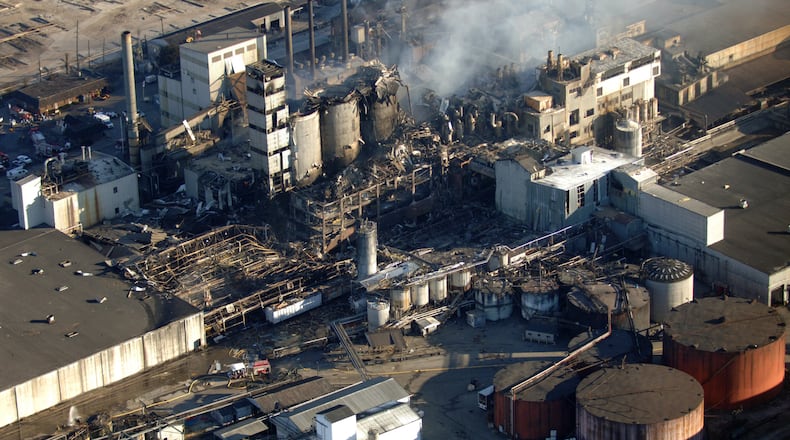Violent explosions racked the Imperial Sugar plant outside Savannah a decade ago, sending fire, fueled by sugar dust, racing through the facility. "Thick concrete floors heaved up and brick walls were blown into stairwells and work areas, blocking many exit routes," the Chemical Safety Board found in its investigation.
Eight workers died at the scene and six more at a regional burn center. Dozens of others suffered life-altering injuries from the Feb. 7, 2008 inferno.
Since then, explosions and fires tied to combustible dust have continued to claim worker lives. Among the latest tragedies, this past May, a blast at a Wisconsin corn processing plant killed five workers and injured a dozen more, including a 21-year-old who had both legs amputated. OSHA's investigation found that the company failed to control highly combustible grain dust.
Shortly after that tragedy last spring, OSHA dropped a proposed standard on combustible dust.
New protections seemed imminent after the Imperial Sugar explosion. The U.S. House passed a bill requiring OSHA to set standards on combustible dust, and the Senate held hearings.
OSHA's own investigation found 124 violations at Imperial's Port Wentworth, Georgia plant, and federal officials accused the company of turning a blind eye to the dangers.
Credit: Lois Norder
Credit: Lois Norder
"I am outraged that this company would show a complete disregard for its employees' safety by knowingly placing them in an extremely dangerous work environment," said Assistant Secretary of Labor for Occupational Safety and Health Edwin G. Foulke Jr., in announcing more than $8.77 million in proposed fines for violations at the Georgia plant and at the company's Louisiana facility.
A year before the blast, the Chemical Safety Board had started pressing OSHA for a national standard on combustible dust, and in 2009, OSHA proposed a new rule.
As the years went on and memories faded, though, various accountability efforts stalled or fizzled.
In 2010, the Department of Labor announced that Imperial Sugar would pay more than $6 million to settle the OSHA case, rather than the $8.77 million that had been proposed. The company admitted no wrongdoing.
In early 2013, a federal prosecutor said no criminal charges would be filed in the blast, citing insufficient evidence.
A few months after that, the Chemical Safety Board took the rare step of rebuking OSHA for not implementing national safety standards on combustible dust, citing the Imperial Sugar explosion and more than 200 other fires and explosions around the country.
In killing the proposed rule this past July, the Trump Administration cited resource constraints and other OSHA priorities. The agency offers only guidance on the issue, highlighting the dangers and the practices and controls that can reduce the potential for an explosion.
The Chemical Safety Board, which irritated the administration by continuing to press for new safety standards, also may be coming to an end. This past November, the agency was informed that the White House would propose eliminating it.
About the Author
Keep Reading
The Latest
Featured



